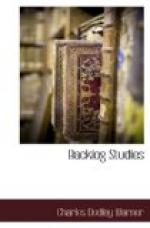My fireplace, which is deep, and nearly three feet wide, has a broad hearthstone in front of it, where the live coals tumble down, and a pair of gigantic brass andirons. The brasses are burnished, and shine cheerfully in the firelight, and on either side stand tall shovel and tongs, like sentries, mounted in brass. The tongs, like the two-handed sword of Bruce, cannot be wielded by puny people. We burn in it hickory wood, cut long. We like the smell of this aromatic forest timber, and its clear flame. The birch is also a sweet wood for the hearth, with a sort of spiritual flame and an even temper,—no snappishness. Some prefer the elm, which holds fire so well; and I have a neighbor who uses nothing but apple-tree wood,—a solid, family sort of wood, fragrant also, and full of delightful suggestions. But few people can afford to burn up their fruit trees. I should as soon think of lighting the fire with sweet-oil that comes in those graceful wicker-bound flasks from Naples, or with manuscript sermons, which, however, do not burn well, be they never so dry, not half so well as printed editorials.
Few people know how to make a wood-fire, but everybody thinks he or she does. You want, first, a large backlog, which does not rest on the andirons. This will keep your fire forward, radiate heat all day, and late in the evening fall into a ruin of glowing coals, like the last days of a good man, whose life is the richest and most beneficent at the close, when the flames of passion and the sap of youth are burned out, and there only remain the solid, bright elements of character. Then you want a forestick on the




